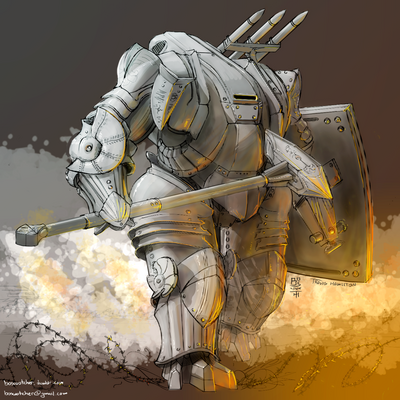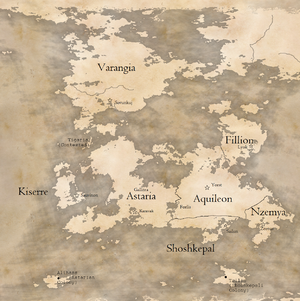Trenchbreaker: Difference between revisions
1d4chan>Netwerker No edit summary |
1d4chan>Netwerker No edit summary |
||
| Line 9: | Line 9: | ||
==Unit Types== | ==Unit Types== | ||
Your force in Trenchbreaker will | Your force in Trenchbreaker will generally consist of three types of units; '''Mecha, Infantry,''' and '''Support''' | ||
===Mecha=== | |||
The primary focus of Trenchbreaker are the mecha. Mecha are armored walking machines, often equipped with weapons more powerful than any infantryman or even team could carry, mecha are fast and powerful enough to avoid homing-in artillery strikes, while also being tough enough to resist any infantry weapon. Mecha are actually very limited in use; since they inevitably run out of power or overheat after a short combat action, they're essentially only useful at capturing enemy trenches and have little purpose outside those roles. Mecha can also be upgraded with Pilots, who can change when in the turn order they act and grant special abilities. | |||
===Infantry=== | |||
The lot of the common infantry soldier has always been poor, and Trenchbreaker takes this to an extreme. No infantry-portable weapons have been devised that can let them have a chance at killing mecha, and infantry are incredibly fragile, dying at essentially any damage. However, infantry are critical to holding captured terrain, which plays into their primary purpose; if you move your infantry models across your enemy's table edge, you score victory points, and if you have more victory points than the other side, you win. | |||
===Support=== | |||
Support options exist in the game's rules, but are off the battlefield and thus indestructible. After all, an artillery piece has range hundreds of times longer than the width of the battlefield, while battlefield commanders are wise enough to stay away from the actual action against the enemy. '''Artillery''' has a fixed cost, and behaves similar to cannons mounted on mecha but less accurately. '''Commanders''' provide an army wide bonus, and their points cost is a percentage of your total army's cost. | |||
=The Setting= | =The Setting= | ||
| Line 16: | Line 28: | ||
(fill in) | (fill in) | ||
=Rules= | |||
Rules are found at this [http://https://drive.google.com/open?id=0BwBWo5FzN-KvfmdER2RVRnlpR0l4cjhjdGF4OEhiQ0NibU9Oa1JEUVFhVnhrZ2YySDJHRTQ|this link]. Comments are enabled on all docs, so any thoughts can be added there. | |||
Revision as of 14:35, 24 December 2015

Trenchbreaker is an in-development tabletop wargame, focusing on fast and brutal trench assaults and featuring mecha of various designs, such as the one seen at right, the Astarian Model 181 "Vanguard" equipped with the "Guardian" Rig. Trenchbreaker's rules and army building are an attempt to combine traditional list-based wargaming with the deckbuilding aspect of TCGs. Trenchbreaker also features simultaneous turns and a damage system based on grinding your enemy's capabilities away until his mecha collapses under him, rather than whittling away at arbitrary health points until it suffers a critical existence failure. It's also notable for its brutality; "Infantry Death Simulator 1916" would not be an inaccurate title.
The Framing
Part of the central conceit of Trenchbreaker is that the action is taking place between two trench lines. These trench lines are simply represented by the edge of the table you're playing on. You are attempting to capture the enemy trench by moving your infantry models across the table and over his edge, while he is doing the same to you.
Unit Types
Your force in Trenchbreaker will generally consist of three types of units; Mecha, Infantry, and Support
Mecha
The primary focus of Trenchbreaker are the mecha. Mecha are armored walking machines, often equipped with weapons more powerful than any infantryman or even team could carry, mecha are fast and powerful enough to avoid homing-in artillery strikes, while also being tough enough to resist any infantry weapon. Mecha are actually very limited in use; since they inevitably run out of power or overheat after a short combat action, they're essentially only useful at capturing enemy trenches and have little purpose outside those roles. Mecha can also be upgraded with Pilots, who can change when in the turn order they act and grant special abilities.
Infantry
The lot of the common infantry soldier has always been poor, and Trenchbreaker takes this to an extreme. No infantry-portable weapons have been devised that can let them have a chance at killing mecha, and infantry are incredibly fragile, dying at essentially any damage. However, infantry are critical to holding captured terrain, which plays into their primary purpose; if you move your infantry models across your enemy's table edge, you score victory points, and if you have more victory points than the other side, you win.
Support
Support options exist in the game's rules, but are off the battlefield and thus indestructible. After all, an artillery piece has range hundreds of times longer than the width of the battlefield, while battlefield commanders are wise enough to stay away from the actual action against the enemy. Artillery has a fixed cost, and behaves similar to cannons mounted on mecha but less accurately. Commanders provide an army wide bonus, and their points cost is a percentage of your total army's cost.
The Setting

(fill in)
Rules
Rules are found at this link. Comments are enabled on all docs, so any thoughts can be added there.